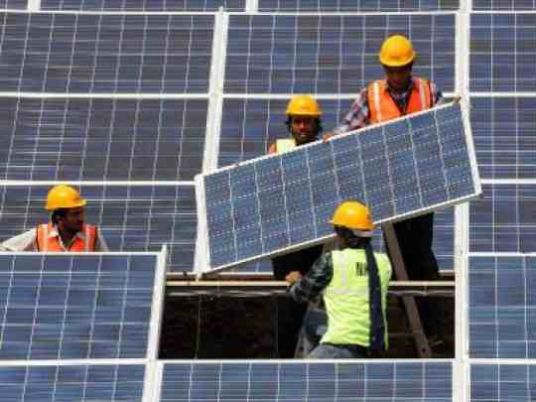The sun, of which Egypt has in abundance, is waiting for us to take action. Yet, as with most of the natural resources that God has blessed Egypt with, the country has not given due attention to building the scientific and technological base required to harness such resources.
Although demonstrations, prototypes and small-scale applications exist, most of these have either been discouraged, aborted, or discontinued for a number of reasons. The main reason being the initial cost of their installation versus that of conventional energy sources which remain heavily subsidized. Furthermore, since the government has not adopted any policy that would promote or encourage the development/use of solar energy in any meaningful way, there is no market for solar products, and consequently they don’t attract investors.
The first National Strategy for the Development and Utilization of New and Renewable Energy in Egypt was formulated in 1986 by the Ministry of Electricity and Energy, with assistance from the UNDP, as a follow up to a recommendation made by the International Conference on New and Renewable Sources of Energy, in Nairobi in 1981.
The question that arises is: If the state has put money and mobilized think tanks to develop a strategy which took more than a year of preparation, why has it not been implemented?
The strategy to exploit non-depletable sources of energy was intended as a measure to reduce fuel consumption following the oil crisis of the 1970s. Had we acted at that time we would have been prepared today to meet the mounting challenges of climate change.
Global warming, as has been repeatedly warned, threatens food security because it affects seasonal crops and irrigation patterns in unpredictable ways. In addition, Egypt is to be especially affected by global warming due to the incessant need to develop new lands.
As communities and cultivations move to the desert, more water is needed at a time when recent political developments threaten respect of long term agreements concluded between Nile riparian countries over water quotas. Egypt also faces threats due to rising sea level of the Mediterranean encroaching over the Delta region. Furthermore, we face the risk of exhausting our oil reserves within the coming decades, augmenting the need to turn to renewable energy sources.
Yet, on the brighter side: Egypt lies within the world’s “solar belt,” a geographic strategic location that indicates its advantageous position for the development of solar energy; we have wind regimes in a number of regions most amenable for exploitation as a clean source of energy; we also have seas bordering our northern and eastern territories that offer us immense reservoirs of water to desalinate if we develop or acquire lower cost technologies.
Talking about a solar agenda does not exclude giving attention to other sources of energy. Although the nuclear option is currently a hot item in the national debate, it remains a political issue and it requires a long lead time to develop as well as to build the necessary capabilities and safety measures.
On the other hand, adopting a solar agenda banks on the fact that the sun is here to stay and its exploitation holds the greatest chances of sustainability. Its technology is simple and is also amenable for use by the poor. With a little attention from the state, scientific knowledge can be introduced to upgrade simple technology to meet basic needs and reduce dependence on conventional sources.
In an international context, why do we always seem to miss chances and opportunities to achieve global competitiveness and, instead, let comparative advantage slip to other countries? Fifteen years after the formulation of the national strategy for the development and use of new and renewable sources of energy, we still don't see solar panels topping Egyptian roofs (we could see satellite dishes, though). Ironically, while we continue to stagnate outside the loop of scientific progress, it is Abu Dhabi that now stands at the forefront of solar technology development and use in the region
Abu Dhabi launched a multi-billion dollar initiative in 2009 called “Masdar” (meaning "source" in Arabic). It is the Emirate’s landmark program to champion the development of advanced energy technologies and promote diversified and sustainable economic growth.
The Abu Dhabi Future Energy Company (ADFEC), a private joint stock company fully owned by Abu Dhabi’s government through the Mubadala Development Company, is mandated to drive the Masdar Initiative. The company has concluded strategic partnerships with leading international energy and technology companies, which, together with other stakeholders, are to drive innovative energy solutions and applications throughout the Emirates and the Middle East and North Africa (MENA) region.
Furthermore, Abu Dhabi, host of the nation's World Future Energy Summit, held this month, has been selected as the interim headquarters of the International Renewable Energy Agency (IRENA), which was established in Bonn in January 2009. To date, 149 states and the European Union signed the Statute of the Agency. Amongst them are African, European, Asian, American and Australia/Oceania States. Selection of Abu Dhabi to host IRENA was done in Sharm El Sheikh in June 2009, though Egypt is still not a signatory state.
IRENA is mandated to promote increased adoption and use of all forms of renewable energy. Acting as the global voice for renewable energies, IRENA is to facilitate access to renewable energy information and technical data. It is to become a global voice for renewable energy and to assist member states in defining their renewable energy strategies.
For the time being, we have no chance of taking leadership in this field. However, we should be prompt in joining IRENA and in finding a niche to contribute, as partners, to the Abu Dhabi initiative.
We have always looked to the West to emulate progress. Perhaps it’s high time for us to look within our own region and reposition ourselves as leaders among our neighbors, not only for our own benefit, but for the region’s as a whole.
The following article is part of Al-Masry Al-Youm's weekly "Environmental Voices" series, in which issues related to the environment–whether local, regional or international in nature–will be discussed from the point of view of environmental experts.




